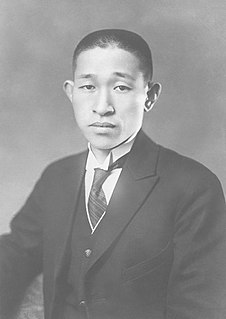A Quote by David Remnick
The question for so many is the quality of work, the future of work under globalism and de-industrialization. A typical example is a person who had a good factory job making 80,000 dollars, with health insurance, who was able to send his kids possibly to college and then he or she suddenly loses that job because the factory closed down. And now that same person is bagging groceries at Walmart and making $35,000.
Related Quotes
If somebody has a property in the middle of a 7,000 job factory, as an example, that's going to move into the town - but they need this one corner of this property, and it's going to provide 7,000 jobs in a community that's dying, of which we have many in this country, OK? I am for that. That's a big economic development
My father was brought to this country as an infant. He lost his mother as a teenager. He grew up in poverty.Although he graduated at the top of his high school class, he had no money for college. And he was set to work in a factory but, at the last minute, a kind person in the Trenton area arranged for him to receive a $50 scholarship and that was enough in those days for him to pay the tuition at a local college and buy one used suit. And that made the difference between his working in a factory and going to college.
The education system is where young skulls full of mush are programmed and propagandized into the system. They are highly valuable. That's why they're subsidized. You know, universities are approaching the same circumstance we have in health care. What it costs is not related at all to market forces. Meaning what it costs is not related to what people can afford. You get right down to it, how many Americans, how many families can afford 20,000, 30,000, $50,000 a year or semester to send their kids off to college? It has to be subsidized.
We've got people that are paying premiums of $1,000 a month out there, and then they've got a deductible of $1,000. If you're making $40,000, $50,000, $60,000 out there and you've got an Obamacare plan, by and large you've got an insurance card, but you don't have any care because you can't afford the deductible.
What would you think of a person who earned $24,000 a year but spent $35,000? Suppose on top of that, he was already $170,000 in debt. You'd tell him to get his act together - stop spending so much or he'd destroy his family, impoverish his kids and wreck their future. Of course, no individual could live so irresponsibly for long. But tack on eight more zeroes to that budget and you have the checkbook for our out-of-control, big-spending federal government.
Soundgarden signing to a major, then Mother Love Bone, and seeing the same happen to Alice in Chains. We were all suddenly making music and recording at the same time, and we had money to do it. It wasn't like a $2,000 recording that you do over a weekend. It's like, 'Wow, maybe this will be our job.'
And now life has become the future. Every moment of your life is lived for the future—you go to high school so you can go to college so you can get a good job so you can get a nice house so you can afford to send your kids to college so they can get a good job so they can get a nice house so they can afford to send their kids to college.
I feel for young people today. When I came out of law school, yes, we were broke, we had kids, we had problems. But it was straightforward. I didn't have to say, "My God, I am $80,000 in debt, I have to get a job, I have to pay it back, my life is ruined otherwise." We were able to go forward and work toward building something new, and that's what we did. Today many lawyers are unable to feel free to be advocates.
In order to do a good job a person must like what he or she is doing....'Love thy work', and you will be successful..... If you do things just because you have to, then you will never enjoy work. Nor will you do a good job if you do it simply out of a sense of duty. stress is often a by-product of such passive or negative attitudes toward work. Paradoxically as it may sound, love of work can be the best medicine for workaholism.
There is nothing a worker resents more than to see some man taking his job. A factory can be closed down, its chimneys smokeless, waiting for the worker to come back to his job, and all will be peaceful. But the moment workers are imported, and the striker sees his own place usurped, there is bound to be trouble.
Health insurance in Germany continues with no change if you lose a job. We do know very well that people who become unemployed are at an increased risk of becoming ill, and therefore becoming unemployed is about the worst time to lose health insurance. So therefore, everyone who loses a job remains in exactly the same insurance system he is in.

































